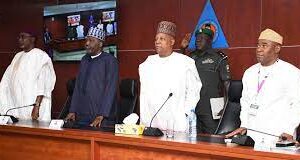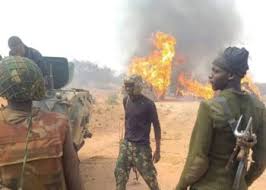The Nigerian Supreme Council for Islamic Affairs (NSCIA) has tasked Muslim Ummah in the country to use the proceeds which they intended to spend on the botched 2020 hajj exercise for charity.
It also advised Muslim faithful to comply with the protocols put together by the Nigeria Centre for Disease Control (NCDC) as they celebrate Friday’s Eid-al-Adha.
NSCIA Deputy Secretary Professor Salisu Shehu gave the advice in a statement issued Sunday in Abuja.
“Eid-al-Adha knocks the door, it is crucial to reiterate that we are living in unusual times where normalcy has become abnormal, including social gatherings and large congregational prayers.
“Muslims are enjoined to note that Eid al-Adha is not a compulsory religious activity (fard) and at no point should it be observed if doing so will undermine the fundamental purpose of Shari’ah: security, a multifaceted concept which includes personal, communal, national, environmental and health components, among others. This is to say that it is not over until it is over,” the statement said.
The NSCIA further said: “This year’s Eid is particularly significant as there will be three Khutbahs (sermons) within two days—the Khutbah of ‘Arafat on Thursday, 9th of Dhul-Hiijah, 1441AH, and the khutbahs of Eid and Jumu’ah on Friday, 10th of Dhul-Hijjah, 1441 AH.
“Indeed, these are extraordinary days every Muslim should reflect and maximise the rare opportunities and virtues they present to invoke the mercy of Allah and His blessings”.
In line with the tradition of the Holy Prophet Muhammad, the group said Muslims “who are not on Hajj are encouraged to fast on the day of ‘Arafat, the 9th day of the month of Dhul-Hijjah, 1441 AH, equivalent to Thursday, 30th July, 2020, while praying fervently to Allah for the forgiveness of sins and healing of the world from all diseases, most especially the destructive coronavirus.”
“With Hajj 2020 being suspended for international participants, save for those in the Kingdom of Saudi Arabia, the NSCIA calls on Nigerian Muslims who had intended Hajj but could not actualise their intention to consider using part (if not all) of the funds meant for the pilgrimage for charitable causes that are capable of earning them the reward of Hajj and much more.
“For those who are willing to spend on charity but lack the trusted and assured channel to execute such, the NSCIA has a special agency registered solely for implementing social and charity projects – Mission for Education, Socials and Health (MESH),” the statement said.
CAN on vigil
Meanwhile, the Cross River state’s chapter of the Christian Association of Nigeria (CAN) has banned churches from holding midweek services or tarry night to curtail the spread of the coronavirus pandemic in the state.
The COVID-19 monitoring team of the religious body, in a press statement made available to our reporter at the weekend, said the decision was reached during a meeting with the special adviser to the governor on religious matters (South), Rev. Fr. Malachy Ephraim, the state’s CAN chairman, Most Rev (Amb) Okon Bassey Ekpenyong and other prominent pastors in the state.
The statement said: “Pastors in the state have been advised to desist forthwith from holding tarry-nights, mid-week services and night prayers to avoid the spread of the coronavirus and wrath of the government.
“The call became necessary considering the fact that the Governor, Sen. Prof. Ben Ayade, in his magnanimity, only approved corporate worship for Muslims on Friday and Christians on Sunday.”
They expressed dissatisfaction with some pastors in the state who they said, were going against government’s directives by holding mid-week services/prayers meetings, saying the new position of government, supported by CAN, was “for the wellbeing of all, because we need to be alive to worship God.”
Making clarification on why markets and other public places were restricted in the same measure churches were, the governor’s aide said there’s an 80 percent possibility of the virus being contacted in a confined place like church compared to 20 percent possibility of contacting it in an open place like markets.
He said contacting the virus in a church would make news headlines than in market places.
Ephraim advised pastors to stop questioning government’s decision, and advised that church leaders should channel their energy to upholding the ethics and codes of their calling in the discharge of their duties to God and humanity rather than abusing government over the COVID 19 challenge.
Although many clergymen who spoke expressed concerns over the new order, majority of ministers and leaders agreed that the ban on tarry night and midweek service should come into effect from Monday, July 27, 2020
Stakeholders also agreed that any church that further violates the guidelines should be recommended to the state government for closure for a period of time.
Cross River state, as at the time of this report, has recorded 37 confirmed cases, while three of three of the cases recovered and one reported dead.




